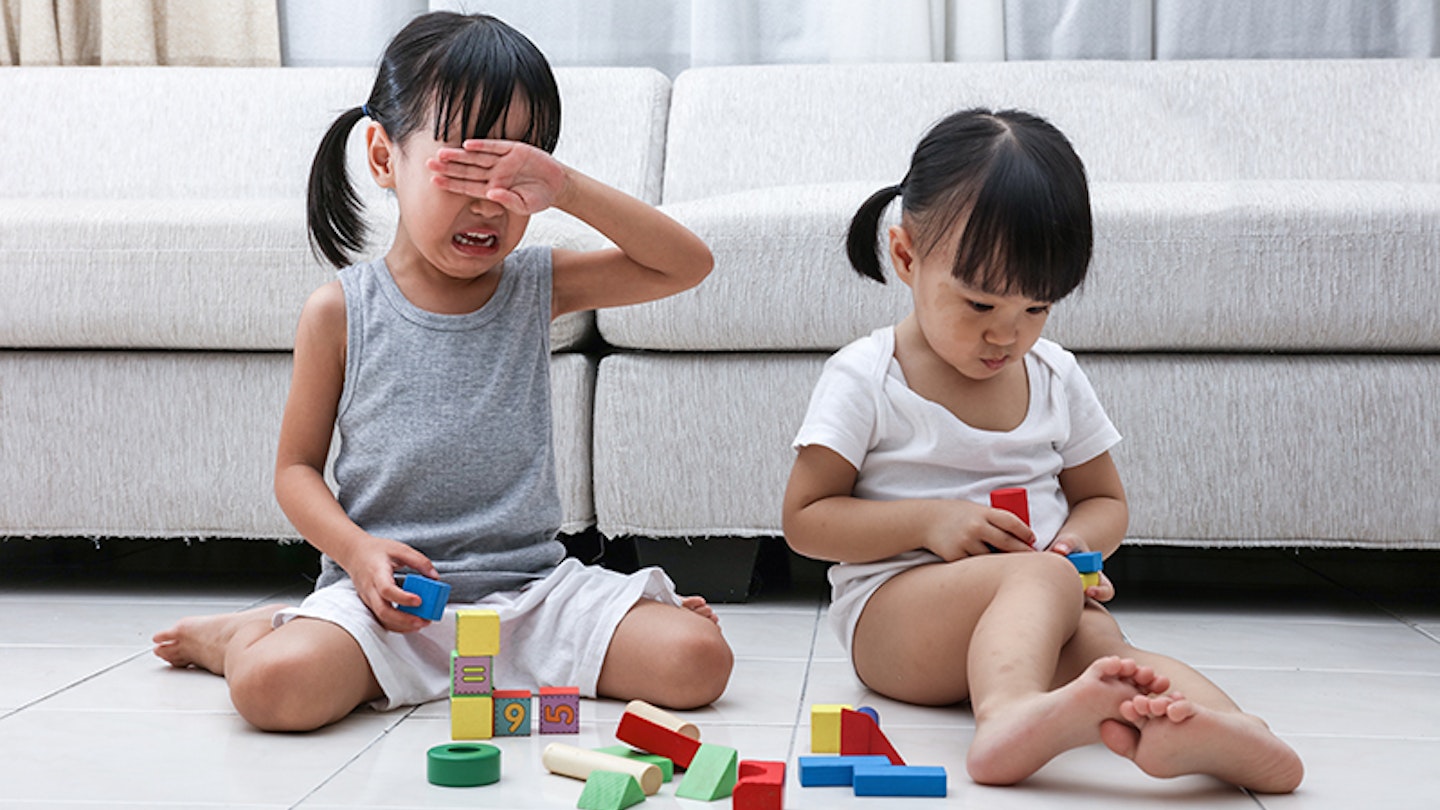It's common for siblings to argue and fight over toys and the attention of their parents. But too much squabbling can be detrimental to children and the harmony of the household. Here, award-winning psychologist Dr Lalitaa Suglani explains all you need to know about sibling rivalry and how to tackle it.
What is sibling rivalry?
Sibling rivalry refers to the competition, jealousy, or conflict that can arise between siblings. It often involves vying for parental attention, resource, or perceived favouritism.
Sibling rivalry can happen for various reasons, including feelings of jealousy, insecurity, or perceived unfair treatment by parents.
It may also stem from differences in personalities, temperaments, or interests between siblings. It can occur at any age but may be more pronounced during childhood and adolescence when siblings are in close proximity and competing for parental attention and resources. Sibling rivalry can occur between same-sex or different-sex siblings, and its prevalence may vary depending on individual family dynamics. Age spacing, gender roles, parental stress, family size, cultural and societal influences and parental favouritism can influence the intensity and nature of sibling rivalry.
5 signs of sibling rivalry that a parent might miss
Signs of sibling rivalry may not always be overt and can sometimes go unnoticed by parents. Some signs of subtle sibling rivalry that parents might miss include:
-
Passive-aggressive behaviour where siblings may engage in subtle acts of hostility or manipulation towards each other, such as making snide remarks, withholding information, or giving backhanded compliments.
-
Competition for attention where siblings may play out for parental attention in subtle ways, such as interrupting each other's conversations with parents, seeking validation through achievements or accomplishments, or exaggerating their needs or concerns to gain more attention.
-
Exclusionary behaviour where siblings may exclude each other from social activities, games, or conversations, subtly communicating feelings of superiority or exclusion.
-
Undermining achievements where siblings may downplay or minimise each other's accomplishments or successes, subtly undermining each other's confidence or self-esteem.
-
Role-playing where siblings may adopt specific roles or identities with the family dynamic, subtly competing for the role of the favourite child or the responsible one, leading to feelings of inadequacy or resentment.
How is rivalry detrimental to siblings?
Rivalry between siblings can be detrimental as it can lead to feelings of resentment, jealousy, low self-esteem and strained family relationships. It may also contribute to increased conflict, aggression and emotional distress among siblings leading to dysfunctions that can be on-going.
Does sibling rivalry tend to last right into adulthood?
While sibling rivalry may lessen as siblings mature and develop their own identities or move away from the family home, it can persist into adulthood if underlying issues are not addressed. Adult siblings may continue to compete for parental approval, inheritance, or social status. So, it can continue even after parents are no longer alive.
Can sibling rivalry ever be healthy?
No. But if managed effectively it can promote healthy competition, social skills development, and conflict resolution skills.
7 ways parents can help their children avoid sibling rivalry
Particularly if you have younger children, it's good to set the foundations for a healthy sibling relationship. This can be as simple as giving a small older sibling gift from the new baby when they arrive. Other things you can do include:
-
Foster positive sibling relationships by encouraging cooperation, empathy, and mutual respect. This can start right from when you first introduce your new baby to your child.
-
Set clear and consistent rules for behaviour and conflict resolution within the family.
-
Avoid comparing siblings or playing favourites, as this can exacerbate feelings of rivalry and resentment.
-
Provide opportunities for siblings to bond and spend quality time together, such as engaging in shared activities or family outings. This can start even before baby arrives, by getting your child involved in shopping for baby number two.
-
Teach children effective communication skills and encourage them to express their feelings and needs openly.
-
Offer praise and encouragement for cooperative behaviour and efforts to resolve conflicts peacefully.
-
Serve as a role model for healthy conflict resolution and demonstrate empathy and understanding toward all family members.
How can a parent recognise if they are showing favouritism?
Recognising parental favouritism requires self-awareness and sensitivity to behaviours that may inadvertently show preference towards one child over others. Five signs of parental favouritism are:
-
Differential treatment and even differential expectations, where you are consistently giving one child preferential treatment in terms of praise, privileges, or opportunities. Or have lower expectations for one child’s behaviour, academic performance, or achievements.
-
Comparison and criticism between siblings or external world, where you are frequently comparing one child unfavourably to their sibling/outside world and constantly highlighting their flaws or shortcomings.
-
Exclusion: where you exclude one child from family activities, discussions, or decision-making processes. Showering one child with excessive gifts, attention, or leniency while imposing stricter rules and expectations on others.
-
Lack of empathy: where you may struggle to empathise with the emotions or needs of one child, dismissing their concerns or struggles.
-
Investing more in one child - whether it’s energy or resources into one child’s hobbies, interests, or activities while neglecting those of their siblings.
Examples of sibling rivalry
Example: One of your children is particularly good at a sport or talented in some way. How can you encourage this without making the other child/children feel like a lesser?
Encouraging a child’s talent or interest in a particular activity while ensuring other siblings feel valued and supported requires a delicate balance and this is where self-awareness and understanding your child is important. Parents can achieve this balance by allocating dedicated one-on-one time with each child to nurture their unique interests, fostering a sense of camaraderie and teamwork within the family, and involving all children in decision-making processes regarding extracurricular activities. Also, by recognising and praising each child’s efforts and achievements, maintaining open and honest communication about the importance of supporting each other’s passions, and providing equitable access to resources, parents can create a supportive and nurturing environment where each child feels empowered to pursue their talents and interests while respecting those of their siblings.
Example: You’re doing homework with your children and your older child doesn’t take care with their handwriting. So, you say something like ‘look at how good your sister’s handwriting is, and she’s only five.’ You’re trying to motivate your older child. But is this type of comparison always unhelpful?
Comparisons can be detrimental when used in a way that undermines a child’s self-esteem or fosters resentment between siblings. In the scenario described, comparing the older child’s handwriting unfavourably to that of their younger sibling may evoke feelings of inadequacy and frustration, rather than motivating them to improve. Instead of focusing on the sibling’s handwriting as a benchmark for comparison, parents can encourage the older child to take pride in their own progress and offer constructive feedback to help them develop their skills.
Example: You’re in another room and one child starts crying. So, you go in, and they claim their sibling hit them. But the sibling says they were struck first. You know your kids and feel you can make an assumption as to what happened based on their usual behaviour. But you weren’t there to see what happened. So, what should you do in this situation?
Regarding parental involvement in sibling conflicts – it’s essential to approach each situation with impartiality and a commitment to understanding all perspectives involved. While it may be tempting to make assumptions based on past behaviour, it’s crucial to gather information objectively and mediate the conflict without assigning blame prematurely. Encouraging open communication, active listening, and conflict resolution skills can empower children to resolve disputes peacefully and foster positive sibling relationships. Ultimately, parents play a vital role in modelling empathy, fairness, and respect in navigating conflicts and promoting healthy interactions among siblings.
How can you encourage children to resolve arguments?
Encouraging children to resolve arguments among themselves can promote independence, problem-solving skills, and stronger sibling relationships. To facilitate this process, parents can establish clear expectations for respectful communication and conflict resolution, emphasising the importance of listening to each other's perspectives and finding mutually agreeable solutions.
Teaching negotiation skills and promoting active listening can empower children to express their needs assertively, negotiate compromises, and consider each other's feelings. Additionally, fostering empathy helps children understand each other's viewpoints and encourages compassionate responses in resolving conflicts.
Parents can provide guidance and support as needed, helping children brainstorm solutions and implement strategies for conflict resolution. By modelling positive behaviour and reinforcing positive outcomes, parents can cultivate a supportive environment where children learn to communicate effectively, collaborate, and resolve disputes independently, fostering harmonious sibling relationships built on mutual respect and cooperation.

Dr. Lalitaa Suglani is an acclaimed psychologist, leadership empowerment expert, international speaker, and author of "High Functioning Anxiety" published by Hay House. Lalitaa's mission is to facilitate transformation in people's lives by promoting understanding and acceptance of emotions, attachments, and relationships. Lalitaa specialises in deep-diving holistic topics such as attachment, inner child work, boundary setting, childhood trauma, self-compassion, relationship dynamics, mindfulness, and the mind-body-energy connection to facilitate meaningful growth and healing.
